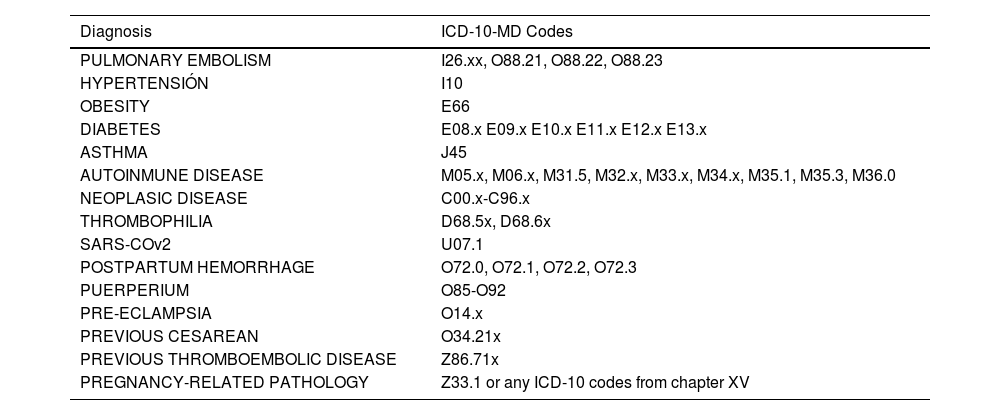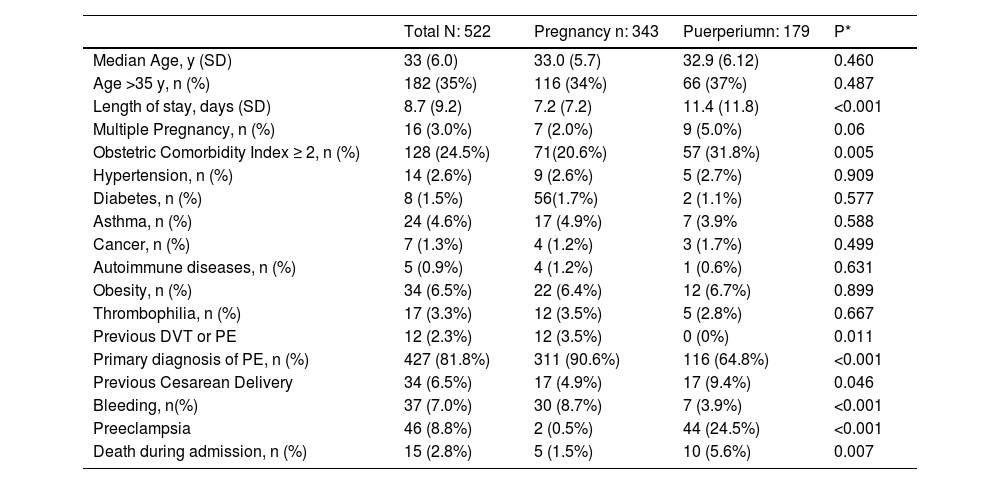This study aimed to estimate the overall and annual age-standardized incidence of pregnancy-related pulmonary embolism (PE) in Spain from 2016 to 2021, explore the distribution of PE events during pregnancy and the postpartum period, identify potential risk factors, and estimate mortality rates during hospital admission.
MethodsIn a retrospective, observational, population-based study, data from the Spanish National Hospital Discharge Database were analyzed to identify women with hospital episodes of pregnancy-related-PE. The primary outcome was the overall and annual age-standardized incidence of pregnancy-related-PE, with secondary aims including the distribution of events during pregnancy and postpartum and the calculation of age-standardized mortality rates during admission.
ResultsAmong 2,178,805 births from 2016 to 2021, 522 women were diagnosed with pregnancy-related PE, yielding an overall age-standardized incidence of 2.83 cases per 10,000 births. A non-significant increasing trend was observed from 2.43 to 4.18 cases per 10,000 births (p = 0.06). Comorbidities were low, with a notable association between PE and SARS-CoV-2 infection during the last two years. The mortality rate among women with pregnancy-related PE was 2.8%, with a higher incidence of PE reported during the postpartum period.
ConclusionThe incidence of pregnancy-related-PE in Spain exhibits a non-significant increasing trend, with a significant risk of mortality. The association with SARS-CoV-2 infection underscores the importance of vigilant monitoring and management of pregnant women, particularly during pandemics. This study contributes specific data on the incidence and characteristics of pregnancy-related-PE in Spain, emphasizing the need to consider PE in the differential diagnosis and management strategies for pregnant and postpartum women.
Este estudio tuvo como objetivo estimar la incidencia general y anual estandarizada por edad de embolia pulmonar (EP) relacionada con el embarazo en España de 2016 a 2021, explorar la distribución de los eventos de EP durante el embarazo y el período posparto, identificar posibles factores de riesgo y estimar las tasas de mortalidad durante el ingreso hospitalario.
MétodosEn un estudio observacional retrospectivo, de base poblacional, se analizaron datos de la Conjunto Mínimo Básico de Datos (CMBD) de Altas Hospitalarias de España para identificar mujeres con episodios hospitalarios de EP relacionados con el embarazo. El resultado primario fue la incidencia general y anual estandarizada por edad de EP relacionada con el embarazo, con objetivos secundarios que incluyeron la distribución de eventos durante el embarazo y el posparto y el cálculo de las tasas de mortalidad estandarizadas por edad durante el ingreso.
ResultadosEntre 2.178.805 nacimientos entre 2016 y 2021, 522 mujeres fueron diagnosticadas con EP relacionada con el embarazo, lo que arroja una incidencia general estandarizada por edad de 2,83 casos por 10.000 nacimientos. Se observó una tendencia creciente no significativa de 2,43 a 4,18 casos por 10.000 nacimientos (p = 0,06). Las comorbilidades fueron bajas, con una asociación notable entre PE y la infección por SARS-CoV-2 durante los últimos dos años. La tasa de mortalidad entre las mujeres con EP relacionada con el embarazo fue del 2,8%, y se informó una mayor incidencia de EP durante el período posparto.
ConclusiónLa incidencia de EP relacionada con el embarazo en España muestra una tendencia creciente no significativa, con un riesgo de mortalidad significativo. La asociación con la infección por SARS-CoV-2 subraya la importancia de un seguimiento y tratamiento atentos de las mujeres embarazadas, especialmente durante las pandemias. Este estudio aporta datos específicos sobre la incidencia y características de la EP relacionada con el embarazo en España, enfatizando la necesidad de considerar la EP en el diagnóstico diferencial y las estrategias de manejo de las mujeres embarazadas y posparto.
Article
Diríjase desde aquí a la web de la >>>FESEMI<<< e inicie sesión mediante el formulario que se encuentra en la barra superior, pulsando sobre el candado.

Una vez autentificado, en la misma web de FESEMI, en el menú superior, elija la opción deseada.

>>>FESEMI<<<










